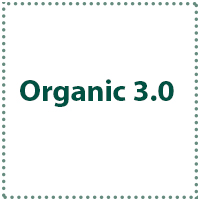Special issue of Organic Agriculture - 3.0
In the latest issue of Organic Agriculture, the editors have collected a number of papers relevant for the theme Organic 3.0. It is published in connection to the science track "Innovative research for Organic 3.0" at the Organic World Congress in India, November 2017.

As described by Ilse A. Rasmussen (ICROFS), Gerold Rahmann (Thünen) and Anne-Kristin Løes (NORSØK) in the introduction of the special issue, five papers have been collected to give a valuable basis for the further discussion of Organic 3.0 and the future development for the organic sector and beyond.
Organic agriculture—whether 2.0 or 3.0—can be one option to solve future problems, and the ideas behind organic agriculture should be integrated as much as possible in many types of agriculture: agroecological, small-holder, conventional, conservation tillage, etc. But organic agriculture should also learn from conventional and other types of agriculture and if necessary take a critical view on, e.g., minimum requirements that result in negative effects on public goods.
From ICROFS, Organic Eprints coordinator Ilse A. Rasmussen, scientific officer Lizzie Melby Jespersen and director Niels Halberg, have contributed to two papers of this special issue of Organic Agriculture vol 7, no.3 (see no. 2 and 5 listed below).
In the foreword of Organic Agriculture, the challenges listed correspond well to those described and discussed in the five papers:
- ORGANIC 3.0—the vision of the global organic movement and the need for scientific support
The development and overall goal of Organic 3.0 is described by Arbenz et al. (2017). They describe that the goal of Organic 3.0 is to enable a wide-spread uptake of truly sustainable farming systems based on organic principles. Instead of the minimum requirements found in Organic 2.0, Organic 3.0 puts the impact of and on the farming system in the foreground. Arbenz et al. (2017) describe the key features of Organic 3.0: (1) a culture of innovation, (2) continuous improvement towards best practice, (3) diverse ways to ensure transparency and integrity, (4) inclusiveness of wider sustainability interests, (5) empowerment from farm to the final consumer, and (6) true value and cost accounting. - Organic Agriculture 3.0 is innovation with research
Rahmann et al. (2016) further develop the concept regarding research and list the most important challenges for organic agriculture: (1) producing sufficient healthful, safe and affordable food for 9–11 billion (people), (2) reduction of pollution and greenhouse gas emissions derived from food production, processing, trading, and consumption, (3) developing food chains driven by renewable energy and recycled nutrients, (4) adapting to climate change and mitigating greenhouse gas emissions, (5) protecting soils, water, air, biodiversity, and landscapes, and (6) taking into account current and emerging ethics, food habits, lifestyles, and consumer needs. - Building a global platform for organic farming research, innovation and technology transfer
Niggli et al. (2017) describe how the work to build a global platform for organic farming research, innovation and technology transfer has been organized with special focus on TIPI—the technology innovation platform of IFOAM-Organics International. They describe the pathways of future research: (1) organic agriculture will become the preferred land-use system in rural areas worldwide, (2) secure food and ecosystems through eco-functional intensification and (3) organic agriculture will produce healthy food in a fair way for the well-being of all. They suggest three strategies to advance global organic food and farming systems research and innovation in the context of the three pathways: (1) develop research methods appropriate for organic food and farming systems, (2) renew partnerships between farmers, farm advisors, scientists and consumers, and (3) integrate technological, social, and ecological dimensions of innovation. - Research strategy of the German Agricultural Research Alliance (DAFA) for the development of the organic farming and food sector in Germany
Hamm et al. (2017) give an example of how a research strategy of the German Agricultural Research Alliance has been developed by an expert forum on Organic Farming and Food. They recommend that three approaches be pursued in parallel: (1) focusing of research on the most important themes, (2) the establishment of efficient structures for research and funding, and (3) more funding for research on organic farming. They identify the most important research topics (in Germany) and give suggestions for how to establish better performing research structures and argue for increased financial resources. - Contribution of organic farming to public goods in Denmark (OPEN ACCESS)
Jespersen et al. (2017) describe the contribution of organic farming to public goods in Denmark. Using the examples pesticides and antibiotics, they describe the status, legislation, and action plans for the use of these in relation to public goods, the contribution of organic farming to public goods based on the restrictive use of pesticides and antibiotics, and the influence on specific public goods such as nature, biodiversity, environment, energy use, climate change, human health and animal health and welfare, and also the possible negative effects and the synergies and dilemmas of the principles and regulations and the effect on the public goods. Thus, they describe how organic farming already now contributes to some of the key features of Organic 3.0, may contribute to solving some of the challenges, and where it could be relevant to focus on action areas.
About Organic Agriculture
The journal Organic Agriculture offers a mixture of original refereed research papers which bring you some of the most exciting developments in sustainable agriculture and food systems often with an inter- or trans-disciplinary perspective.
Organic Agriculture is the official journal of the International Society of Organic Agriculture Research, ISOFAR. ISOFAR was launched in 2003 and seeks to promote, encourage and support research in all areas of Organic Farming by facilitating global co-operation in research, methodological development, education and knowledge exchange,